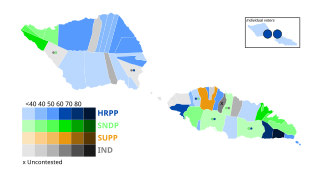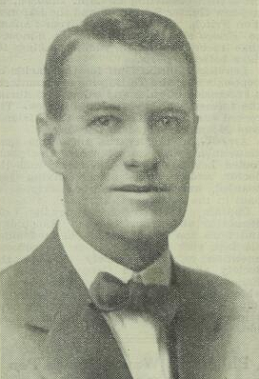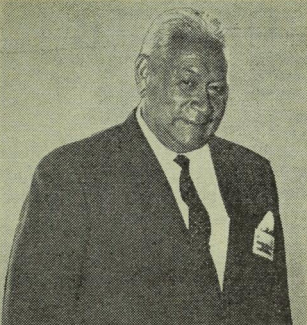 |
|---|
Legislative elections were held in American Samoa on 7 November 1972, alongside a referendum on electing the Governor. [1]
 |
|---|
Legislative elections were held in American Samoa on 7 November 1972, alongside a referendum on electing the Governor. [1]
Successful candidates in the Senate election included Tago Ativalu, Talio Magalei and Fainu'ulelei S. Utu.
Following the elections, Governor John Morse Haydon was called before a Civil Service Commission tribunal, having been charged with attempting to influence the elections by telling voters not to vote for non-Samoan candidates (of which there was only one in the election, Wilbur Reine in Manu'a). [2] [3] When interviewed on the WVUV radio station prior to the elections, Haydon had said he could not give his views on individual candidates as he was bound by the Hatch Act, but that he thought it would be a "very serious mistake" for voters to elect a non-Samoan during the transition to self-government. [1] The tribunal ruled that Haydon had not violated the Hatch Act as the intervention was limited to a single interview and had not used his influence over subordinates, and that in borderline cases the First Amendment required ruling in favor of the defendant. [1]

Aifili Paulo Lauvao, was twice governor of American Samoa. The founder of the U.S territory's Democratic Party, he had a long career in the legislature and the judiciary in American Samoa.

General elections were held in American Samoa on 4 November 2008 to elect a governor, members of the House of Representative, and a delegate to the United States House of Representatives, as well as a referendum on a legislative override of the governor's veto. The elections were held as part of the wider 2008 United States general election.

General elections were held in Samoa on 2 March 2001 to determine the composition of the 13th Parliament. Prime minister Tuilaʻepa Saʻilele Malielegaoi led the Human Rights Protection Party (HRPP) into the election. Opposition leader and former prime minister and future head of state, Tui Ātua Tupua Tamasese Efi led the Samoan National Development Party (SNDP) into the election. The HRPP won 23 seats, but initially fell short of a majority. The SNDP won 13 seats, the Samoan United People's Party secured one seat and the remaining 12 were won by independents. Following the election, all 12 independents joined the HRPP, giving the party a majority in parliament and allowing Tuila'epa to remain prime minister.

General elections were held in American Samoa on November 2, 2010. The deadline to register as a candidate for the election was September 1, 2010.

General elections were held in Western Samoa on 4 April 1964, the first since independence in 1962. All candidates ran as independents. Following the elections, Fiamē Mataʻafa Faumuina Mulinuʻu II remained Prime Minister.

General elections were held in Western Samoa on 25 February 1967. All candidates ran as independents and voting was restricted to Matai and citizens of European origin, with the Matai electing 45 MPs and Europeans two. Following the election, Fiame Mata'afa Faumuina Mulinu'u II remained Prime Minister.

General elections were held in Western Samoa on 7 February 1970. All candidates ran as independents, with voting restricted to matais and citizens of European origin, with the matais electing 45 MPs and Europeans two. Following the election, Tupua Tamasese Lealofi IV became Prime Minister.

General elections were held in Western Samoa on 24 February 1973. All candidates ran as independents and voting was restricted to matai and citizens of European origin, with the matai electing 45 MPs and Europeans two. Following the election, Fiame Mata'afa became Prime Minister for a second term, having previously held the office between 1959 and 1970.

General elections were held in Western Samoa on 21 February 1976. All candidates ran as independents and voting was restricted to Matai and citizens of European origin, with the Matai electing 45 MPs and Europeans two. Following the election, Tupuola Efi became Prime Minister.

General elections were held in Western Samoa on 24 February 1979. Voting was restricted to matai and citizens of European origin, with the Matai electing 45 MPs and Europeans two. Although all candidates ran as independents, an opposition bloc had emerged following the 1976 election of Tupuola Efi as Prime Minister in Parliament.

General elections were held in Western Samoa on 27 February 1982. The Human Rights Protection Party won 22 of the 47 seats in the Legislative Assembly and was able to form a government after three independents voted for its leader, Va'ai Kolone, in the vote for Prime Minister.

A referendum on direct election of governors and vice governors was held in American Samoa on 7 November 1972 alongside legislative elections. Voters were asked to approve a proposal which permitted direct popular election of governors and lieutenant governors. The turnout of 28.20% was very low, and the measure was rejected, with 17.30% voting yes and 82.70 voting no.

A constitutional referendum was held in American Samoa on 6 November 1973. Voters were asked to whether they approved of a new constitution, The new constitution provided for the direct election of the Governor and Lieutenant Governor, a doubling of the salaries for members of the Fono, issuing government bonds to raise money, and decentralising some powers to counties and villages.

A referendum on direct election of governors and vice governors was held in American Samoa on 18 June 1974. Voters were asked to approve a proposal which permitted direct popular election of governors and lieutenant governors. The measure was narrowly rejected, with 47% voting yes and 53% voting no. An identical measure would be put before voters again two years later and was passed.

General elections were held in Western Samoa on 9 November 1932.

Alfred George Smyth was a New South Wales-born Western Samoan politician.

General elections were held in Western Samoa on 15 November 1957.

General elections were held in Western Samoa on 4 February 1961. They had originally been planned for November 1960, but were postponed by three months.
Tualaulelei Mauri was a Western Samoan chief and politician. He served as a member of the Legislative Council and Legislative Assembly between 1943 and 1961, and as Minister of Lands and Minister of Agriculture between 1956 and 1961.

Afioga Afoafouvale Misimoa, also known by his European name Harry William Moors, was a Western Samoan businessman and politician. He served as a member of the Legislative Assembly in two spells between 1951 and 1967, and was the first Pacific Islander to become Secretary-General of the South Pacific Commission. He also founded the Samoa Rugby Union.